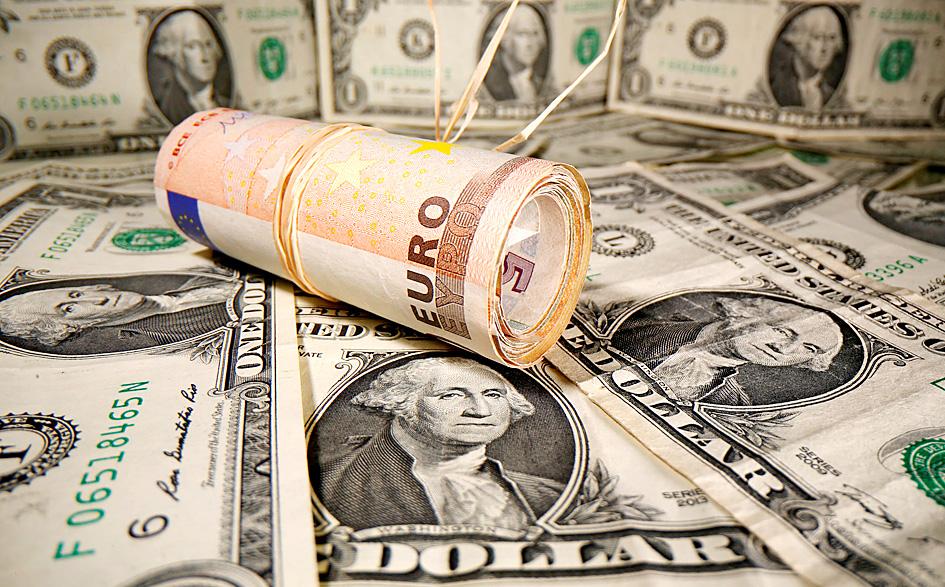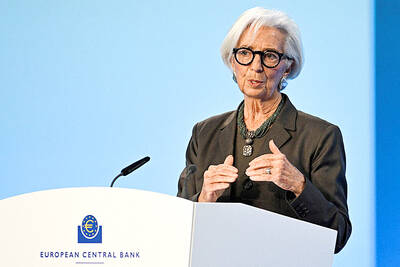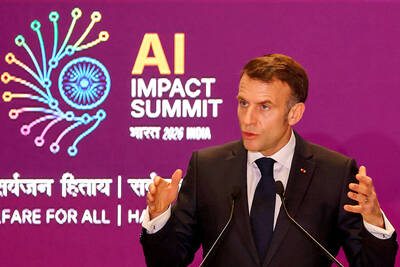The US dollar rose on Friday, after the US said that Russia has massed enough troops near Ukraine to launch a major invasion.
A Russian attack could begin any day and would likely start with an air assault, US National Security Adviser Jake Sullivan told a media briefing.
The US dollar had been trading mostly sideways when the US warning hit markets.

Photo: Reuters
The US dollar index, a measure of the greenback against six major currencies, rose 0.5 percent to 96.03, posting a weekly increase of 0.57 percent.
The US dollar’s rise was due to Sullivan’s comments, as well as reports that Russian President Vladimir Putin had decided to invade Ukraine, which the White House later disputed, said Bipan Rai, head of FX strategy at CIBC Capital Markets in Toronto.
That move up, along with moves in other safe-haven assets such as US Treasuries and the Japanese yen, indicates the market is growing more and more concerned about the prospect of an invasion, Rai said.
“It’s definitely a safe-haven move,” he said.
The New Taiwan dollar declined against the US dollar on Friday, losing NT$0.021 to close at NT$27.846. It was down 0.02 percent from US$27.841 on Monday last week. The markets were closed until then due to the Lunar New Year holiday.
The Japanese yen gained 0.63 percent versus the greenback to ¥115.29, while the Canadian dollar weakened as the potential for an imminent Russian attack triggered a sell-off in risk-sensitive assets. Russia’s currency, already lower for the day, fell further on the news to 76.79 rubles per US dollar.
Washington urged all US citizens to leave Ukraine within 48 hours. Other countries — including Britain, Japan, Latvia, Norway and the Netherlands — told their citizens to leave Ukraine immediately.
The euro weakened as markets processed the news to 0.88 euros, and posted a weekly decline of 0.87 percent after European Central Bank President Christine Lagarde said in an interview that raising rates now would not bring down record eurozone inflation and would only hurt the economy.
The greenback had struggled to pick a direction earlier in the day as investors digested the University of Michigan’s preliminary consumer sentiment index for this month.
That report found that US consumer sentiment fell to its lowest level in more than a decade early this month amid expectations that inflation would continue to rise in the near term.
Economists polled by Reuters had forecast the index edging up.
The market’s lack of clarity as to how interest rate hikes might progress has contributed to frenzied sessions this week as the US dollar remains undecided on the future, Wells Fargo Securities currency strategist Erik Nelson said.
“I tend to think we consolidate in the short term here, and am still biased toward euro downside, dollar upside against most currencies,” he said.
Additional reporting by staff writer and CNA

European Central Bank (ECB) President Christine Lagarde is expected to step down from her role before her eight-year term ends in October next year, the Financial Times reported. Lagarde wants to leave before the French presidential election in April next year, which would allow French President Emmanuel Macron and German Chancellor Friedrich Merz to find her replacement together, the report said, citing an unidentified person familiar with her thoughts on the matter. It is not clear yet when she might exit, the report said. “President Lagarde is totally focused on her mission and has not taken any decision regarding the end of

French President Emmanuel Macron told a global artificial intelligence (AI) summit in India yesterday he was determined to ensure safe oversight of the fast-evolving technology. The EU has led the way for global regulation with its Artificial Intelligence Act, which was adopted in 2024 and is coming into force in phases. “We are determined to continue to shape the rules of the game... with our allies such as India,” Macron said in New Delhi. “Europe is not blindly focused on regulation — Europe is a space for innovation and investment, but it is a safe space.” The AI Impact Summit is the fourth

CONFUSION: Taiwan, Japan and other big exporters are cautiously monitoring the situation, while analysts said more Trump responses ate likely after his loss in court US trading partners in Asia started weighing fresh uncertainties yesterday after President Donald Trump vowed to impose a new tariff on imports, hours after the Supreme Court struck down many of the sweeping levies he used to launch a global trade war. The court’s ruling invalidated a number of tariffs that the Trump administration had imposed on Asian export powerhouses from China and South Korea to Japan and Taiwan, the world’s largest chip maker and a key player in tech supply chains. Within hours, Trump said he would impose a new 10 percent duty on US imports from all countries starting on

STRATEGIC ALLIANCE: The initiative is aimed at protecting semiconductor supply chain resilience to reduce dependence on China-dominated manufacturing hubs India yesterday joined a US-led initiative to strengthen technology cooperation among strategic allies in a move that underscores the nations’ warming ties after a brief strain over New Delhi’s unabated purchase of discounted Russian oil. The decision aligns India closely with Washington’s efforts to build secure supply chains for semiconductors, advanced manufacturing and critical technologies at a time when geopolitical competition with China is intensifying. It also signals a reset in relations following friction over energy trade and tariffs. Nations that have joined the Pax Silica framework include Japan, South Korea, the UK and Israel. “Pax Silica will be a group of nations